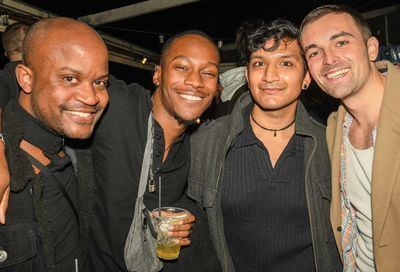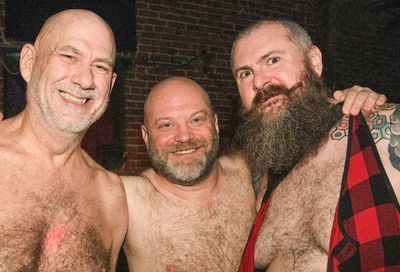Common Sense
''Families Like Mine'' is obvious but emotionally captivating
Abigail Garner is preaching to the choir.
A columnist and GLBT activist, Garner works primarily with gay families, so unsurprisingly her new book, Families Like Mine, is a collection of anecdotes and information targeted to gay parents, adult gay children, and the various people in their lives. Garner’s writing clips along easily, and the book is conversational rather than academic. That she has cut her teeth writing a regular column is clear.
Garner’s introduction opens like a personal column, including a seemingly innocuous anecdote about her life, her connection to the interviewees, definitions of a few coined words (“homo-hostile, ” “colager, ” “queerspawn “), and a chapter rundown.
Her chapter topics include Growing Up Under Scrutiny, Coming Out, Navigating Homophobia, GLBT Kids of GLBT Parents, and Straight Children who Identify as Culturally Queer. Yes, this is interesting stuff.
Which makes the oversimplified presentation all the more disappointing. While the personal stories highlighted in the book are often fascinating and moving, the bulk of the chapters are written as if for an almost ignorant audience. They state and restate the seemingly obvious – children face societal pressures no matter how loving their home – and contort that simple fact countless times to fit it every imaginable situation.
There are some important points here: Garner’s call for a “verbal revolution ” is well thought out and deeply stirring, and the discussion of the stigma a heterosexually-inclined child can feel in a queer household is an unexpected, but vital, area to explore.
Still, at times it felt like this was a near-perfect 25 page pamphlet, expanded unnecessarily into a full-length book. The very useful resource guide at the back only confirms this idea.
The strongest element of the book, and the most enjoyable, is the regular insertion of those stories from adult children of gay parents, and the occasional interjection of one of the gay parents themselves. This includes Garner’s own story: her parents divorced when she was very young, and her father partnered with another man. She presents herself easily and honestly — so much so that more than once I found myself wishing she had written a memoir instead.
|
That personal aspect is what makes Garner’s decision to put off disclosing her own sexuality until late in the book all the more strange. While her choice makes sense in the context of straight and gay kids’ struggles in a blended GLBT/homophobic world, her decision nonetheless undermines her authority as author. Despite her rightful claim that children of GLBT families must be allowed to come out in their own time, in this book, it may feel to readers like she is hiding something. When, at the near-end of the book, she discusses her own coming out, it is not at all what most readers would expect.
Ari, one of Garner’s subjects, says “most families are dysfunctional regardless of sexual orientation, ” and that sums up both the strength and weakness of the book. While there is great information here for prospective GLBT parents, it is also, mostly, basic common sense. Harassment is bad, communication is good. The world should be a better place.
Again, preaching to the choir.
But as it progresses, the book does accrue a kind of weight. Despite the ever-evolving realities of homophobia and societal stigma, and the unique tenor of the challenges that they face, gay families are like every other family in their successes and in their dysfunction.
Families Like Mine expresses one final rule with absolute clarity. No matter the situation at home or in the world, no matter the bigotry a gay person may face, their role as parent must come first. And they must always remember: it is the parent who must take care of the child. It should never be the other way around.
Support Metro Weekly’s Journalism
These are challenging times for news organizations. And yet it’s crucial we stay active and provide vital resources and information to both our local readers and the world. So won’t you please take a moment and consider supporting Metro Weekly with a membership? For as little as $5 a month, you can help ensure Metro Weekly magazine and MetroWeekly.com remain free, viable resources as we provide the best, most diverse, culturally-resonant LGBTQ coverage in both the D.C. region and around the world. Memberships come with exclusive perks and discounts, your own personal digital delivery of each week’s magazine (and an archive), access to our Member's Lounge when it launches this fall, and exclusive members-only items like Metro Weekly Membership Mugs and Tote Bags! Check out all our membership levels here and please join us today!

























